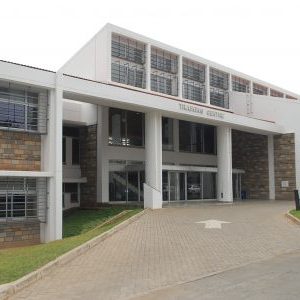Eastern and Southern Africa Centre of International Parasite Control (ESACIPAC)

Overview
Eastern and Southern Africa Centre of International Parasite Control (ESACIPAC) was established in May 2001 with the goal of coordinating activities on school health based parasite control in the Eastern & Southern Africa region under the framework of the Global Parasite Control Initiative (also called Hashimoto initiative). Japan successfully eliminated major parasitic diseases, including malaria, lymphatic filariasis, schistosomiasis and intestinal worms using a school health based approach. Based on this experience, the Government of Japan in 1998 proposed the Hashimoto initiative and established three research and training centres around the world – in Asia, East Africa, and West Africa.
The Kenya Medical Research Institute (KEMRI) officially inaugurated ESACIPAC as a research and training centre of the institute in 2002 to ensure its sustainability and as a strategy to improve KEMRI’s contribution to capacity building for human health improvement through supporting parasite control activities in the region.
Although the Hashimoto Initiative stopped abruptly in 2008, the Centre has made major strides forward realizing substantial growth in number of projects and diversity of activities undertaken. New partnerships and collaborations have been established ensuring that ESACIPAC continues to be a regional Centre of excellence in parasite control
Mission
To be a leading Centre of excellence in human health research and capacity development aimed at improving the quality of life of people affected by parasitic diseases.
Vision
To be a regional centre of excellence
Mandates
-
- Participation in prevention and control of parasitic diseases through,
- Evaluation of tools and strategies for parasite control
- Public health and social science research
- Strengthening regional capacity for school health and nutrition through,
- Workshops/ Training courses
- Technical meetings
- Technical assistance in the implementation of public health programmes
- Strengthening partnerships for research, training and capacity building in parasite control through,
- Supporting the development of guidelines and strategic plans
- Establishment of a reference regional NTD laboratory
- Training students from local universities
- Sharing best practices for prevention and control of parasitic diseases through operation research in malaria and NTDs including schistosomiasis, soil-transmitted helminths and lymphatic filariasis
- Participation in prevention and control of parasitic diseases through,
Products and Services
- Specialized technical services to research projects and public health programmes.
- Training facilities and services.
- Technical support to Ministry of Health.
Ongoing Projects
COMING SOON
Completed Projects
COMING SOON
Parasiology & Entomology
To conduct research on parasitic diseases particularly malaria and NTDs, to evaluate tools and strategies for parasite control, to work with the Ministry of Health in mapping and surveillance (epidemiology) for parasitic diseases. To conduct monitoring and evaluation for Ministry of Health School-based and community-based parasite control and elimination programmes.
Functions
- Coordinate support of the Ministry of Health and other sectorial programmes to control and/or eliminate preventive chemotherapy neglected tropical diseases.
- Providing technical support to the Ministries’ control and elimination programmes and sharing best practices.
- Collaborating with the Ministry of Health in mapping, surveillance, monitoring and evaluation of parasitic disease control and elimination programmes.
- Sensitizing the community through workshops, seminars, conferences and symposia.
- Capacity building of Ministry of Health Officers in NTDs surveillance and mapping
Public Health & Social Sciences
To conduct implementation research for preventive chemotherapy NTDs targeted for control and/elimination by the Ministry of Health and other ministries as well as malaria.
Functions
- Identifying barriers and facilitators in accessing populations targeted for preventive chemotherapy and malaria control (LLN use and coverage, IPT)and come up with improved scalable strategies for reaching/accessing such population.
- Conducting knowledge, attitudes and practices of communities regarding parasitic diseases.
- Sharing best practices parasitic disease control and elimination strategies.
- Capacity building for the Ministry of Health and other collaborating ministry officers in the counties in the implementation of the school-based deworming programme.
Molecular Biology
To evaluate tools and strategies for parasite control, to provide NTDs research diagnostic services
Functions
- To evaluate tools and strategies for parasite control, to provide NTDs research diagnostic services.
- To capacity build at the NTDs reference regional laboratory in ESACIPAC and provide services
Immunology & Serology
To evaluate tools and strategies for parasite control, to provide NTDs research diagnostic services.
Functions
- To evaluate tools and strategies for parasite control, to provide NTDs research diagnostic services.
- Capacity building of Ministry of Health Officers in the evaluation of tools and strategies of parasite control and diagnostics
Partners & Collaborators
| World Health Organization (WHO) |
| Neglected Tropical Diseases (NTD)& Global Malaria Program (GMP) |
| Ministry of Health |
| Ministry of Education |
| Ministry of Agriculture |
| Liverpool School of Tropical Medicine (LSTM) |
| Nagasaki University of Tropical medicine (NUTM) |
| Innovation for Poverty Action (IPA) |

Dr. Doris Njomo
Deputy Director, ESACIPAC
Dr. Doris Njomo is principal research scientist at the Kenya Medical Research Institute (KEMRI) in Nairobi. She holds a PhD in Public Health from Jomo Kenyatta University of Agriculture and Technology. Her thesis topic was on Social and Behavioral Factors influencing Compliance with Mass Treatment in the National Programme for the Elimination of Lymphatic Filariasis in Kenya.
Dr. Njomo’s research interests are in social determinants of health and health-seeking behavior. She has experience of over 15 years conducting implementation research in control and elimination of preventive chemotherapy Neglected Tropical Diseases (NTDs), operational research in the National School Based Deworming (NSBD) program and social and behavioral research in the area of drugs and substances abuse among others. Dr. Njomo has extensive experience in conducting quantitative and qualitative research studies.
Dr. Njomo has published several papers in peer-review journals and mentored several undergraduate and post graduate students. In addition, she reviewed grant applications including the European and Developing Countries Clinical Trial Partnerships (EDCTP), the Consortium for National Health Research (CNHR), the Coalition for Operational Research (COR) on NTDs, Neglected Tropical Diseases NGO Network and participated as a panelist and judge in several fora.
Currently, Dr. Njomo is working on a project funded by the Bill & Melinda Gates Foundation whose objective is to improve access to morbidity management and disability prevention services for persons with lymphoedema in Coastal Kenya through an integrated health system’s approach in support of MOH preparation of dossier for certification of elimination of Lymphatic Filariasis by WHO
Contact Info
P.O. Box 54840, Nairobi, KENYA
Tel: +254-20-2731192/3, +254-20-2722541
Fax: +254-2-2717521, 2731194
